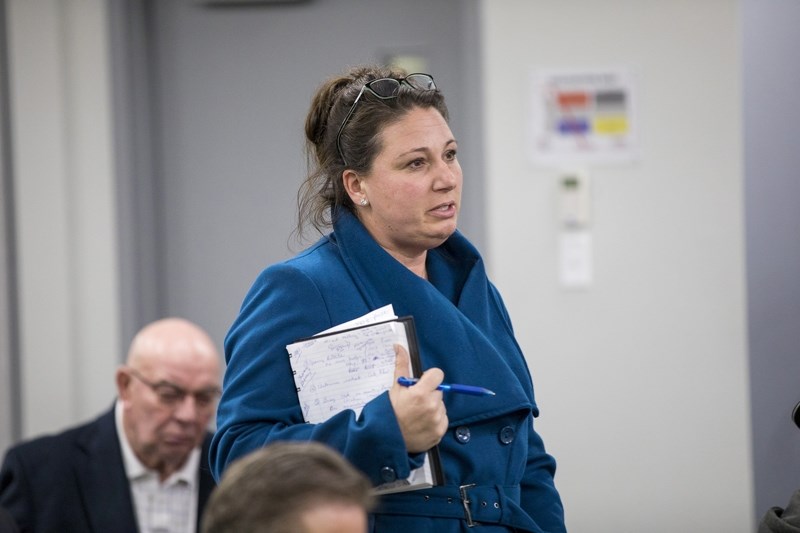Theft has become a regular occurrence at Angela Groeneveld’s family’s Gladys Ridge-area farm, but it took a scary turn during one incident last year.
Thieves made it inside their house while their son was home.
“They had gone through the whole house upstairs and then he met him in the basement and it was a total of 45 minutes, closer to an hour before the police were able to arrive,” said Groeneveld.
The thieves left after being confronted, but not before stealing vehicles from the property.
Groeneveld was one of approximately 30 people who shared their personal stories of theft and break-ins at their homes and farms during a town hall meeting on rural crime on Feb. 21.
The meeting was hosted by Foothills MP John Barlow and Highwood MLA Wayne Anderson as part of a joint initiative by Alberta’s United Conservative Party and the federal Conservative Party.
It was one of many events hosted by MLAs and MPs across rural Alberta to gather input for a report on rural crime that will be submitted to the provincial and federal governments.
According to RCMP statistics presented to the MD of Foothills, property crimes in the area have risen from 531 in 2014 to 961 in 2017.
Over the same period, crimes against people in the MD are have remained steady from 166 in 2014 to 164 in 2017.
RCMP Supt. Gordon Sage told the audience at last week’s meeting criminals have changed their tactics and become more brazen.
He said the RCMP is seeing groups of criminals who are travelling together covering a larger turf. Criminals are also becoming more aggressive, said Sage.
“When we stop cars on the road, and usually they’re stolen vehicles, we’re getting a lot more aggressive actions to police,” he said.
Sage said it’s a challenge to get funding to hire more police officers so the RCMP is adapting its approach. He said Crime Reduction Units have been formed in each of the force’s four districts in the province.
Sage said the teams can identify trends and target prolific criminals over large areas. The RCMP is using analytics to look at trends and share information between detachments.
That is why it’s so important people report crimes, thefts and suspicious behaviour, he said.
It’s also important for people to know which RCMP detachment area their property falls under, he said, and the detachment’s phone number. In an emergency people should call 911, but non-emergency issues should be reported to the local detachment.
Chris Linnington, Foothills Rural Crime Watch vice-president, said he’s concerned rural crime has surpassed the ability of police to respond.
“It just seems that whatever effort is thrown into it, it’s not enough,” he said.
Linnington said the association wants to organize seminars and events to help people learn about what they can do on their own. However, this takes money – something the association doesn’t have.
“We have no funding,” said Linnington. “The funding is done by people giving us $20, sometimes $10.”
He said the organization needs funds to be able to hire experts to help educate with residents, to rent halls for meetings or to improve communication.
Groeneveld said there needs to be more police officers, even if it means higher taxes or redirecting funds from other areas.
“We know that the densities and populations are increasing so why isn’t our police force increasing with that,” she said.
The impact of crime on insurance costs is a concern for Groeneveld. She said she would rather pay higher taxes for more police officers than more for insurance.
“It’s getting to the point where you don’t want to report the batteries that are stolen off the farm, or the fuel because your premiums are just going to go up,” she said.
MD of Foothills Reeve Larry Spilak said the MD is considering hiring and paying for additional RCMP constables.
The MD is hosting a meeting on rural crime on April 10 at the Foothills Centennial Centre in Okotoks at 7 p.m.
“I think we all know that policing has to be improved or increased and how it’s improved, if it’s increased by increasing the amount of bodies or being more proactive by our residents, I’m not sure,” said Spilak.
He said it could also be time to start looking at satellite RCMP detachments in higher population areas in the MD, such as Heritage Pointe.
“I think they should’ve been treating our Heritage Pointe properties as a village or a town when it comes to policing,” said Spilak. “There’s enough crime there that they need more awareness, so I think that’s a valid point.”
Sage said satellite detachments don’t always work.
“I’m not saying it would never happen, but you really have to look at where it is and what the benefit and what the non-benefits are,” he said.
Sage said they aren’t always an efficient use of resources.
“Many times we have satellite offices and it’s the hope that members can get out to the satellite office, but when you only have two or three people on a shift, it’s hard to pull one away to sit in a satellite office,” he said.




